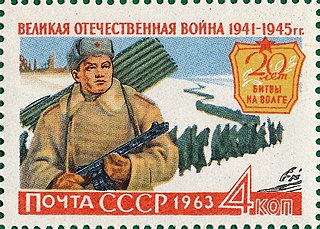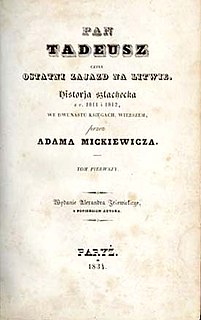See also
- The 1812 Overture, by Tchaikovsky
1812 may refer to:
Null may refer to:

"God Save the Tsar!" was the national anthem of the Russian Empire. The song was chosen from a competition held in 1833 and was first performed on 18 December 1833. It was composed by violinist Alexei Lvov, with lyrics written by the court poet Vasily Zhukovsky. It was the anthem until the Russian Revolution of 1917, after which "Worker's Marseillaise" was adopted as the new national anthem until the overthrow of the Russian Provisional Government.

The Great Patriotic War is a term used in Russia and some other former republics of the Soviet Union to describe the conflict fought during the period from 22 June 1941 to 9 May 1945 along the many fronts of the Eastern Front of World War II, primarily between the Soviet Union and Nazi Germany. For some legal purposes, this period may be extended to 11 May 1945 to include the end of the Prague offensive.

Prince Mikhail Illarionovich Golenishchev-Kutuzov was a Field Marshal of the Russian Empire. He served as a military officer and a diplomat under the reign of three Romanov monarchs: Empress Catherine II, and Emperors Paul I and Alexander I. Kutuzov was shot in the head twice while fighting the Turks and survived the serious injuries seemingly against all odds. He defeated Napoleon as commander-in-chief using attrition warfare in the Patriotic war of 1812. Alexander I, the incumbent Tsar during Napoleon's invasion, would write that he would be remembered amongst Europe's most famous commanders and that Russia would never forget his worthiness.

The Year 1812, Solemn Overture, Op. 49, popularly known as the 1812 Overture, is a concert overture in E♭ major written in 1880 by Russian composer Pyotr Ilyich Tchaikovsky to commemorate the successful Russian defense against Napoleon's invading Grande Armée in 1812.
Goncharov is a Russian surname, an equivalent of the English "Potter", shared by the following people:
Alexander Pushkin (1799–1837) was a Russian poet.
Lisa or LISA may refer to:
Thirteen ships of the British Royal Navy have been named HMS Surprise or HMS Surprize, including:
A hunter is a person who hunts.
Borisov or Borisova may refer to:

Pan Tadeusz is an epic poem by the Polish poet, writer, translator and philosopher Adam Mickiewicz. The book, written in Polish alexandrines, was first published by Aleksander Jełowicki on 28 June 1834 in Paris. It is deemed one of the last great epic poems in European literature.
Plato was a Greek philosopher.
Vsevolod or Wsewolod is a Slavic male first name. Its etymology is from Slavic roots 'vse' (all) and 'volodeti' and means 'lord-of-everything/everybody',. It is equivalent to the Belarusian Usievalad, Polish Wszewład, Lithuanian Visvaldas, Latvian Visvaldis and German Wissewald. The corresponding Russian patronymic is Vsevolodovich.
Android may refer to:
President most commonly refers to:

The French invasion of Russia, also known as the Russian campaign, the Second Polish War, the Second Polish campaign, the Patriotic War of 1812, and the War of 1812, was begun by Napoleon to force Russia back into the Continental blockade of the United Kingdom. Napoleon's invasion of Russia is one of the best studied military campaigns in history and is listed among the most lethal military operations in world history. It is characterized by the massive toll on human life.
The War of 1812 was a military conflict between the United States of America and the British Empire.
The Battle of Moscow was a 1941–1942 battle during World War II.